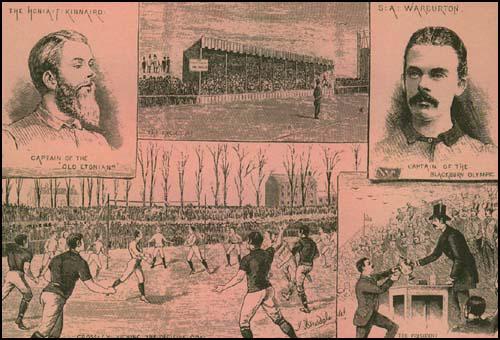Jack Hunter
John (Jack) Hunter was born in Sheffield in 1852. He worked as a butcher. A talented centre-half, Hunter also played local football for Sheffield Heeley.
Hunter won his first international cap for England against Scotland on 2nd March, 1878. The England team included Norman Bailey (Clapham Rovers), Arthur Cursham (Notts County), Percy Fairclough (Old Foresters), George Heron (Wanderers), Beaumont Jarrett (Cambridge University), Edward Lyttelton (Cambridge University), William Mosforth (Sheffield Albion), Henry Wace (Wanderers), Conrad Warner (Upton Park) and John Wylie (Wanderers). England lost the game 7-2 and Hunter was dropped from the team.
Hunter returned to the England team against Scotland on 13th March, 1880. England lost the game 5-4. Two days later Hunter was a member of the team that beat Wales 3-2. Hunter regained his place in the England team for the next two seasons. However, England lost all four games: Wales (0-1), Scotland (1-6), Scotland (1-5) and Wales (3-5).
Jack Hunter joined Blackburn Olympic as player coach in 1882. Hunter, who was a local pub landlord, introduced training methods that encouraged combination play. Hunter persuaded the Blackburn Olympic management committee to enter the FA Cup for the first time. Blackburn beat Lower Darwen 9-1 in the second round of the competition. This was followed by victories against Darwen Ramblers (8-0), Church (2-0) and Druids (4-0). Hunter, who also played at centre-half for Olympic, led his team to a 4-0 victory over Old Carthusians in the semi-final of the competition.
Jack Hunter decided to take his team away to Blackpool to prepare for the Cup Final against Old Etonians. As Marc Keech pointed out in the Encyclopedia of British Football : "This was the first recorded occasion of sustained systematic training, with players leaving home for a period of time to live communally. The planned tactics of sideline runs and cross-field passes resulted in Olympic winning the Cup." Blackburn Olympic had become the first northern team to win the FA Cup.

Blackburn Olympic had another good cup run in the 1883-84 season. They beat both Old Wykehamist and Northwich Victoria 9-1. However, they lost to the Scottish side, Queen's Park in the semi-final.
Jack Hunter joined Blackburn Rovers in 1887. He was now 35 years old and only played in a few games before retiring and did not feature in the first season of the Football League (1888-89). He worked as a assistant trainer at the club for several years. During this time Blackburn won the FA Cup in 1890.
Jack Hunter, who was also a pub landlord in Blackburn for several years, died on 13th April, 1903.
Primary Sources
(1) James Walvin, The People's Game (1975)
The progress of the FA Cup mirrored the changing social progress of football. The decade of dominance by the public school teams was ended at the 1881 final between Old Carthusians and Old Etonians. In the following year the Old Etonians were back again, this time to face Blackburn Rovers. In 1883 another Blackburn team, Olympic, travelled to the London final, taking the trophy north for the first time. Blackburn Olympic, under the control of Jack Hunter, their player-manager, had trained for the final at the booming seaside town of Blackpool and when they stepped out to meet Lord Kinnaird's Old Etonians, the social contrast could not have been greater. Among the Blackburn players were three weavers, a spinner, a dental assistant, a plumber, a cotton operative and an iron-foundry worker. Having won 1-0 in extra time, the Blackburn team was welcomed home by huge crowds headed by yet another manifestation of the new working-class social life - a brass band. Blackburn Olympic had approached the game in a most professional manner. Financed by a local iron-foundry owner, they had trained carefully for a week and had stuck to a suitable diet.
